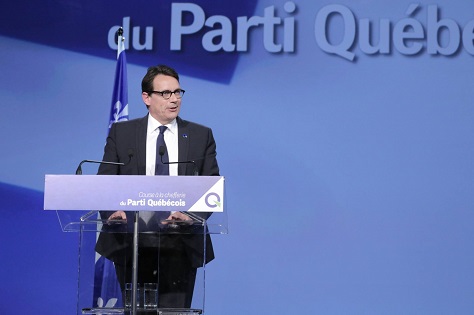It wasn’t a surprise that Pierre-Karl Péladeau won the leadership of the Parti québécois (PQ) last weekend.![]()
![]()
Péladeau, the former CEO of Quebecor, the province’s leading media corporation, took the leadership easily on the first ballot with 57.6% of the vote. He easily defeated Alexandre Cloutier, a young moderate who nevertheless placed second with 29.21% of the vote, and Martine Ouellet, a more traditional PQ leftist. But Péladeau’s victory was sealed earlier this year when the momentum of his campaign forced heavyweights like Jean-François Lisée and Bernard Drainville out of the running.
Péladeau, accepting the party’s leadership with a vow to ‘make Québec a country,’ has a huge task ahead.
* * * * *
RELATED: Péladeau continues march to PQ leadership
RELATED: Québec election results — four reasons why the PQ blew it
* * * * *
After just 18 months in office, the province’s voters rejected the minority PQ-led government in April 2014, restoring to power the Parti libéral du Québec (PLQ) under the leadership of former health minister Philippe Couillard. It was a disastrous defeat for the PQ and for premier Pauline Marois, who lost her own riding in the provincial election. Péladeau, who thundered into the election campaign as a first-time candidate, quickly overshadowed Marois with talk of a fresh independence vote for the province, forcing Marois to spend weeks talking about hypothetical referenda, currency and border questions. Arguably, the PQ never subsequently regained a credible shot at winning the election.
Moreover, Péladeau has sometimes stumbled throughout the months-long campaign often designed as an exercise in rebuilding. He never fully repudiated the party’s disastrous (and many would say illiberal and racist) attempt to enact the charte de la laïcité (Charter of Rights and Values) that, among other things, would have banned government employees from wearing any religious symbols. In March, Péladeau said that ‘immigration and demography’ were to blame for the independence movement’s waning support. As a media tycoon who has pledged only now upon his election as PQ leader, to place his Quebecor stock in a blind trust, leftists throughout Québec remain wary of his leadership. His battles to defeat unions as a businessman are as legendary as his temper.
The latest Léger Marketing poll from April 11 shows the PLQ with a stead lead of 37% to just 28% for the PQ. François Legault’s center-right, sovereigntist Coalition avenir Québec (CAQ) would win 21%, and the pro-independence, leftist Québec solidaire would win 10%.
All of which makes it baffling that Péladeau’s rise to the leadership has been so effortless. With the future of the struggling independence on the line, the party faithful never really forced Péladeau to fight for the leadership. It’s a lot of faith to place in such a political novice — and no one really knows whether he’ll turn out more like Lucien Bouchard or Michael Ignatieff.
With a solid PLQ majority, the province may not hold an election until sometime in 2018. That gives Péladeau time to grow into the role of opposition leader and a plausible potential premier. In one sense, his task is easy — to grind down a PLQ government that will face a tightening budget, especially if the Canadian economy stumbles in the years ahead.
Péladeau’s more existential challenge is to define a role for the PQ in a world where young Quebeckers increasingly see themselves as part of Canada. They don’t necessarily believe that celebrating their French heritage is inconsistent with getting ahead in a North American market where the English language overwhelmingly dominates. Péladeau doesn’t mince words, and since entering the political sphere last year, he has consistently made the case that the PQ should be firmly pro-independence, not just opaquely sovereigntist. The example of Scotland’s first minister Nicola Sturgeon, whose Scottish Nationalist Party (SNP) won 56 of Scotland’s 59 constituencies, should give Péladeau hope.
But Scotland’s issues with the wider United Kingdom are much different in nature than Québec’s issues with Canada, where succeeding governments have gone out of their way for decades to accommodate the unique role of the French-speaking province as a nation within Canada.
As the October federal election approaches, for example, Mario Beaulieu’s Bloq québécois (BQ) is averaging just under 18% of the vote — putting it in fourth place behind the progressive New Democratic Party (NDP), Justin Trudeau’s Liberal Party and even prime minister Stephen Harper’s Conservative Party. The Bloq, which had held a majority of the province’s seats in the Canadian House of Commons since 1993, lost all of its seats in the 2011 general election — and it’s in danger of recapturing none of them in 2015. That would be a huge blow to Beaulieu and to the Bloc, but also to Péladeau’s leadership.
